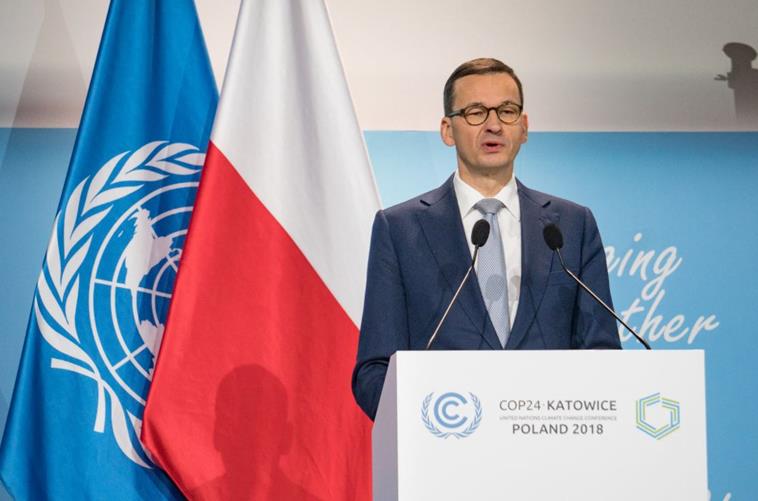Arguably the most significant issue in Europe today is the ongoing dispute between Poland and the European Union (EU) over judicial preeminence.
On Oct. 7 Poland’s Constitutional Tribunal ruled that EU law does not have primacy over national legislation. The case was brought before the Tribunal last March by Poland’s prime minister, Mateusz Morawiecki, after the European Court of Justice (ECJ) ruled that Morawiecki’s new system of appointing judges, established in 2018, violated EU law. The Constitutional Tribunal in Warsaw specifically ruled that the legitimacy of judges already appointed under the new rules could not be challenged using EU law.
The decision of Poland’s highest court is a major and unprecedented challenge to the EU’s acquis communautaire. This French term refers to the cumulative body of European Community laws and forms the foundation of the EU legal order. All official EU sources assert that member states and their citizens must obey the acquis.
“EU law has primacy over national law, including constitutional provisions,” the European Commission insisted in response. “All rulings by the European Court of Justice are binding on all member states’ authorities, including national courts,” the statement continued, warning that the Commission would “not hesitate to make use of its powers under the Treaties to safeguard the uniform application and integrity of Union law.”
The ECJ upped the ante on Oct. 27 by imposing a fine of one million euros (US$1.16 million) per day on Poland until Morawiecki’s Law and Justice (PiS) government brings its legislation into line with the ECJ’s own ruling. This decision was hailed by loud cheers from dozens of mostly leftist members of the European Parliament, who consider Poland and Hungary countries ruled by “right-wing populists” who need to be brought to heel. The mainstream commentariat was also predictably supportive, while the Commission in Brussels naturally expressed its satisfaction.
Poland will likely stand firm on this issue because it directly concerns its national sovereignty. It is considered as important as the rejection of mandatory migrant relocation quotas by the Visegrad Four nations (Poland, Czech Republic, Slovakia, and Hungary) in 2018.
Warsaw does not dispute that EU laws take precedence in some specific areas covered by individual treaties signed and ratified by all EU member states. They dispute, however, the ECJ’s assertion that EU laws trump national constitutions, pointing out that this principle is not contained in any treaties.
This is considered a matter of existential significance not only by Poles but also by opponents of Euro-federalism everywhere, most notably in Budapest. Since the EU has no bailiffs who can collect a million euros a day from the National Bank in Warsaw, Brussels has the option to deduct the money from various European funds of which Poland is the biggest recipient in the 27-nation bloc. At last year’s EU summit, the country received €124 billion for 2021-27, rising to €160bn ($185 billion) with soft loans.
If the funds are cut off or the fines deducted, Morawiecki has said that it would be the equivalent of declaring World War III. The metaphor may be too strong, but it is likely that Poland would resort to the nuclear option of withholding its membership fees from the EU and vetoing all its decisions. As an illustration of its determination, the Polish Ministry of Foreign Affairs recently summoned the Belgian ambassador in Warsaw, Luc Jacobs, to express extreme displeasure over Belgian Prime Minister Alexander De Croo’s strong rebuke of Poland’s position. Such strong diplomatic gestures have no recent precedent in relations between two member-countries of the European Union.
The Poles believe they have a strong card. One is the pressure on the EU’s external eastern border. The president of Belarus, Aleksander Lukashenko, has countered EU sanctions against Minsk by facilitating the smuggling of hundreds of Middle Eastern migrants across the border with Poland and Lithuania. The government in Warsaw has taken firm steps to make the border less porous and the migrant influx has stopped. This has prompted a group of members of the European Parliament from the conservative parties to express their appreciation of Morawiecki for protecting the Union’s external border.
In contrast to the leftist/progressive Euro-MPs—most notably German Greens and Social Democrats—the EU Commission and the Council are not interested in escalating the conflict. They want to avoid the risk of Poland blocking EU decisions by vetoing them. They are also aware that, far from leaving the stage, the PiS may win the next election with an increased majority by presenting itself as the victim of unjust and illegal meddling from Brussels.
It is therefore likely that European Commission President Ursula von der Leyen will seek compromise rather than risk a new crisis within the EU. The deal may entail largely cosmetic changes of Polish laws to satisfy the form of apparent compliance and prevent the interruption of budgetary flows, but it will leave the issue of primacy unresolved.
Poland’s dispute with Brussels reflects an unresolvable latent crisis. The EU is controlled by an unelected apparat whose members rejectthe notion that Europeans are defined by blood ties, collective memories, emotional bonds, culture, and kinship. Instead, their Europe supposedly marches along the path of “civilization, progress and prosperity, for the good of all its inhabitants, including the weakest and most deprived… to strive for peace, justice and solidarity throughout the world.” As I pointed out in these pages after a visit to Brussels in 2019, “its derivative policies are predictable: the EU apparat relentlessly encourages abortion, deviancy, cultural and spiritual self-destruction of native Europeans, and their demographic replacement by migrant melange.”
This is the Europe of Brussels, which is anti-Europe. Trust the traditionally plucky Poland to resist its diktats with gusto.
Image Credit:
Flickr-UNclimatechange, CC BY-NC-SA 2.0

Leave a Reply